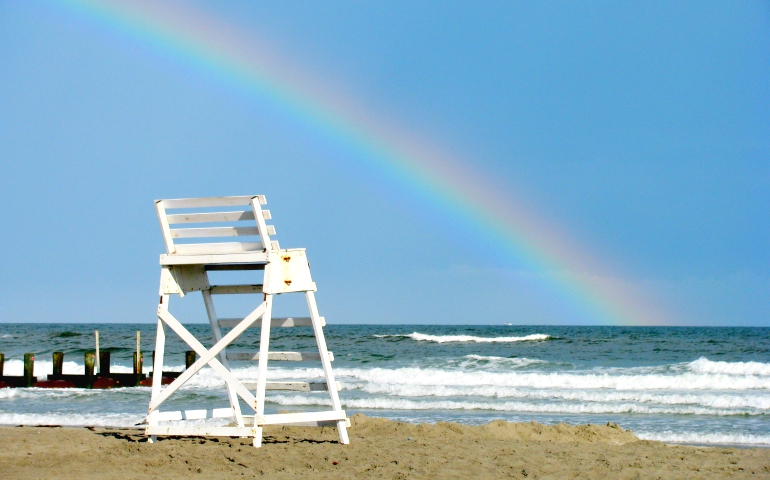
(Wikimedia Commons/V Connelly)
In a few weeks, our family will travel halfway across the country for our annual vacation at the Atlantic Ocean. During this one week at the home of a generous relative, I will do my best to do nothing: no work, no writing, no syllabus-planning, not even work-related reading.
The only things on my "to-do" list will be walks on the beach, building drip sand castles with my kids and catching up on my novel-reading. The big decisions will involve which night to go to the amusement park on the boardwalk, or whether to eat pizza or crab cakes for dinner.
Believe it or not, such leisure can be a challenge for some folks, including me. My German/Swiss background has so instilled the value of hard work that I can have a hard time relaxing when there are things I could be accomplishing.
And, of course, the technology that keeps me constantly tethered — to work, to others and to the news — doesn't make downtime any easier. Even my faith life, with its emphasis on doing God's work in the world, can result in too much action and not enough contemplation.
But the beach vacation is sacred. It was there — at the Jersey Shore, of all places — that I learned that Sabbath is not just for Jews. God wants me to take a vacation.
The importance of rest as a spiritual practice finds its origin in our shared creation story, which has even God resting on the seventh day after six busy days of creating the world. Yet this divine modeling goes unfollowed by most Christians and even many Jews today. I'm reminded of how countercultural Orthodox Jews are when I see them walking to the synagogue, since their tradition sees driving a car as work. Meanwhile, most of us can hardly refrain from checking our work email at night and on the weekends.
Too often, Christians have simplified the "keep holy the Sabbath" commandment to mean only attending worship services, not abstaining from work. And yet, even if we find ways to take weekend breaks from our jobs, our leisure activities may create the need for others to work on what should be their Sabbaths.
Work and productivity are important, but it's not a coincidence that religious traditions urge us to find balance in our lives and put a value on rest.
But most Americans are not listening. More than half of us haven't taken a vacation in the last year, according to a survey conducted by a travel insurance company; more than a third haven't been on vacation in more than two years. (A vacation, for this survey, is defined as "a leisure trip of at least a week to a place that is 100 miles or more from home.")
Even if you don't take that long or that distant of a getaway, the tendency is not to take time off from work. About 54 percent of U.S. workers do not use all the vacation time allotted to them by their employers, according to a survey sponsored by Project: Time Off, which also has connections to the travel industry. From 1978 to 2000, Americans averaged about 20 vacation days per year. That's down to 16.8 today, after a decade and a half of decline, although small increases in the past two years indicate the trend may be reversing.
It turns out that the workers who see themselves as indispensable or become "work martyrs" out of fear often find that skipping those vacations is counterproductive. They are less likely to receive raises or bonuses and no more likely to get promoted than the average worker, according to Project: Time Off. What they do get is stress.
But arguing for rest because of what it might help you accomplish at work is the height of irony. Instead, let's rest because it is good for us to spend time with our families, our friends, in nature and with our thoughts. God called it good: "So God blessed the seventh day and hallowed it, because on it God rested from all the work that he had done in creation" (Genesis 2:3).
The other extreme — sloth or laziness — has been labeled as a sin in our Catholic tradition, even a deadly sin at that. What if we saw excessive work as sinful, too, not only on the part of the worker, but by the societal structures that demand nonstop productivity from workers?
[Heidi Schlumpf teaches communications at Aurora University and is the author of Elizabeth Johnson: Questing for God.]




